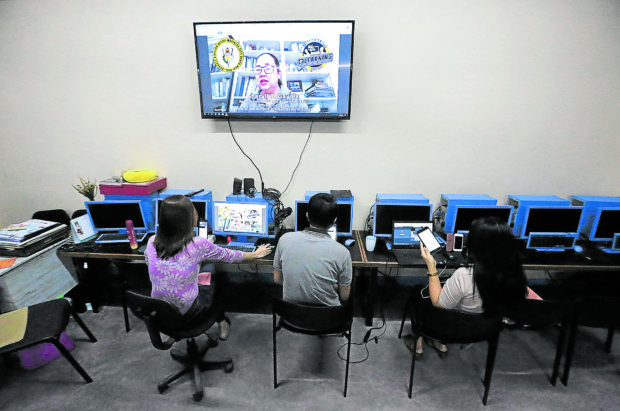In-person classes to start January in low-risk areas

TRAINING IN E-LEARNING Through a webinar on Tuesday, teachers at Jesus de la Peña National High School in Marikina City undergo training for the “blended learning” approach to education, with about a month to go before the start of the new school year. —GRIG C. MONTEGRANDE
MANILA, Philippines — President Rodrigo Duterte has approved in-person classes in schools in parts of the country with low risk for new coronavirus transmission, but the Senate’s basic education chief has called for the suspension of the plan to protect students, teachers and parents from COVID-19.
Mr. Duterte changed his stand two months after he declared that he would not allow in-person classes in schools unless a vaccine for COVID-19 became available.
“I’m with you on this . . . Let’s try to make ourselves productive even how constricted the times are. I’m OK with it,” Mr. Duterte said in a televised address to the nation on Tuesday morning.
Aug. 24 school opening
Mr. Duterte was responding to Education Secretary Leonor Briones, who presented the proposal of the Department of Education (DepEd) for in-person classes in low-risk areas of the country by the third quarter of school year 2020-21, or January.
Briones said schools would open as planned on Aug. 24, as there were still no implementation rules for Republic Act No. 11480, the new law that authorizes the President to to move the school opening during a state of emergency or calamity.
“Vietnam opened classes in May, Singapore in June. Thailand and other countries began in July. We are the last to resume classes because we are taking all precautions to ensure that our children’s continued education will be safe,” Briones said at a press briefing.
She said in-person classes would start in January, but schools that opened in June with in-person classes would be allowed to continue.
But Sen. Sherwin Gatchalian, chair of the Senate basic education committee, called on the DepEd to suspend the resumption of in-person classes because it would increase movement, which could result in a further surge in coronavirus infections.
Gatchalian pointed out that COVID-19 cases rose after quarantine restrictions in Metro Manila and other parts of the country were relaxed to reopen the economy.
Infections in schools
“Allowing [in-person] classes will once again enhance the movement of people that might result in infections within our schools,” he said.
He also said provinces that had no COVID-19 cases experienced outbreaks when people who were stranded in Metro Manila when Luzon was placed on lockdown in March were allowed to go home.
“We don’t want a scenario where physical classes will be opened but will eventually be suspended again because of infections,” Gatchalian said.
“The safety of our learners, parents and teachers cannot be compromised. Our children are our greatest wealth and their well-being should be protected at all cost,” he added.
Sen. Francis Tolentino, one of the authors of RA 11480, said he supported the decision to allow in-person classes in low-risk areas because it would help the DepEd manage its limited resources for “blended” learning, which would be the norm in high-risk areas.
But he said health measures should be strictly implemented in areas where in-person classes would be allowed.
The DepEd said only schools that had applied for permission to conduct in-person classes would be allowed to do.
Presidential spokesperson Harry Roque told a press briefing the COVID-19 task force would inspect participating schools to ensure that they could meet health standards.
He said the standards include wearing of masks, hand-washing, regular disinfection of school premises and temperature check.
—With reports from Leila B. Salaverria and Jodee A. Agoncillo